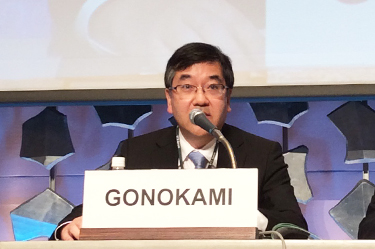President Gonokami Delivers Speech at the STS Forum

 President Gonokami speaking at the STS Forum
President Gonokami speaking at the STS Forum
The 13th Annual Meeting of the Science and Technology in Society (STS) Forum was held in Kyoto, Japan, from October 2nd to 4th, 2016. President Gonokami attended on October 2nd and spoke at a panel discussion titled "The Role of Universities." In his comments, President Gonokami stated that one of the most important roles of universities is to contribute to global society through synthesizing the great diversity of knowledge nurtured by societies around the world with the aim of facilitating the emergence of new social and economic systems.
President Gonokami's comments, delivered in English, can be read in their entirety below.
Related link: STS Forum
The Science and Technology in Society (STS) Forum is an event created to give not only scholars and researchers, but also policymakers, business leaders and media leaders from all over the world a place to meet and discuss science and technology issues in the 21st century. In their discussions, participants explore the opportunities brought about by science and technology, as well as address how to remove the barriers to using science and technology to solve the problems facing humanity.
Creating Excellence from Diversity:
The University of Tokyo
Incremental improvements do not produce new systems. We need a major transformation in our approach. I believe such a transformation originates in diversity of knowledge. The great physicist Dr. Philip Anderson used the words “more is different” to propose the concept of “emergence,” when different materials combine to produce a substance with different properties. For example, particular arrangements of atoms and molecules can give rise to superconductors with properties that do not exist in the individual components.
Over generations, societies around the world have nurtured a great diversity of knowledge. By synthesis of this knowledge, we should see the emergence of new value and novel systems. The university has a critical role as a platform for such collaboration.
In the University of Tokyo charter, we declare our commitment to serving a global public. As a leading university located in Asia, the University of Tokyo has a tradition of integrating Eastern and Western scholarship to create and apply new knowledge. Our effort to enhance the diversity of both faculty and students is to facilitate this process. This year we welcomed international students from over 107 countries, a 22% increase from 2004. We continue to work to diversify our faculty by recruiting more women and foreign academics. But diversity itself is not our final goal. It must be accompanied by a mechanism to create academic excellence, which can then offer new solutions.
In the past, problems were clearly defined. The challenge was to find out “how” to solve them. Today, the intellectual challenge is to find out “what” is the problem.
Discovering “what” needs to be done to turn academic findings into something useful for the economy and society cannot be done by universities alone. We need strong ties with people working on the ground. Up until recently, university-private sector partnerships were driven by individual laboratories, narrowly focused on “how” to address a particular problem. Just as today’s challenges have changed, we urgently need to reconsider how we think about these partnerships.
Two new projects are steps toward this transformation. One is in the growing field of information engineering, and the other is in sports science. Through these projects, we are exploring new and effective types of private sector partnership. Sitting at the same table, together we can identify “what” needs to be addressed and immediately prioritize our intellectual resources. These collaborations could bring about a paradigm shift in university-private sector partnerships.
* * *
Respect for academic freedom is essential to the university. Universities must not be controlled by powerful economic actors and the system they create. However, to bring about major social transformation, we need to work together and offer concrete proposals to improve the system for everyone. This will strengthen not only our financial base and enable us to further expand diversity but also promote further innovations. It will also stimulate the production and free exchange of ideas at all levels of society. The role of the university is to guide such an “intellectually free society” towards a brighter future.
There is great diversity in the excellent teaching and research taking place around the world. Academia’s mission is to create, out of this diversity, the new system needed by global society. The University of Tokyo, a cornerstone of this global diversity of knowledge, is working to become a global base for knowledge collaboration. First we must appreciate our own traditions and unique strengths as assets in the global setting. We should then make them accessible to benefit the global community. Universities located in non-Western countries have a particular responsibility to foster their own distinct qualities to ensure a diverse knowledge base for all humanity.
* * *
The University of Tokyo will continue to strive to create excellence from diversity.
Makoto Gonokami
President
The University of Tokyo
October 2, 2016
Classification
Other
Intended for
General public / Enrolled students / Applying students / International students / Alumni / Companies






